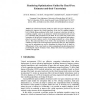Free Online Productivity Tools
i2Speak
i2Symbol
i2OCR
iTex2Img
iWeb2Print
iWeb2Shot
i2Type
iPdf2Split
iPdf2Merge
i2Bopomofo
i2Arabic
i2Style
i2Image
i2PDF
iLatex2Rtf
Sci2ools
124
click to vote
ISVC
2005
Springer
2005
Springer
Rendering Optimizations Guided by Head-Pose Estimates and Their Uncertainty
In virtual environments, head pose and/or eye-gaze estimation can be employed to improve the visual experience of the user by enabling adaptive level of detail during rendering. In this study, we present a real-time system for rendering complex scenes in an immersive virtual environment based on head pose estimation and perceptual level of detail. In our system, the position and orientation of the head are estimated using stereo vision approach and markers placed on a pair of glasses used to view images projected on a stereo display device. The main innovation of our work is the incorporation of uncertainty estimates to improve the visual experience perceived by the user. The estimated pose and its uncertainty are used to determine the desired level of detail for different parts of the scene based on criteria originating from physiological and psychological aspects of human vision. Subject tests have been performed to evaluate our approach.
Related Content
| Added | 28 Jun 2010 |
| Updated | 28 Jun 2010 |
| Type | Conference |
| Year | 2005 |
| Where | ISVC |
| Authors | Javier E. Martínez, Ali Erol, George Bebis, Richard D. Boyle, Xander Twombly |
Comments (0)

